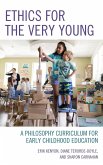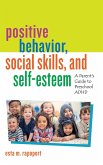Michael J. Kaufman, Sherelyn R. Kaufman, Elizabeth C. Nelson
Learning Together
The Law, Politics, Economics, Pedagogy, and Neuroscience of Early Childhood Education
Michael J. Kaufman, Sherelyn R. Kaufman, Elizabeth C. Nelson
Learning Together
The Law, Politics, Economics, Pedagogy, and Neuroscience of Early Childhood Education
- Gebundenes Buch
- Merkliste
- Auf die Merkliste
- Bewerten Bewerten
- Teilen
- Produkt teilen
- Produkterinnerung
- Produkterinnerung
This book makes a comprehensive, multi-disciplinary argument for investing in effective early childhood education programs, especially those that develop in children their proven natural capacity to construct knowledge by building meaningful relationships. Recent insights in the fields of law, policy, economics, pedagogy, and neuroscience demonstrate that these particular programs produce robust educational, social, and economic benefits for children and for the country. The book also provides legal and political strategies for achieving these proven benefits as well as pedagogical strategies…mehr
Andere Kunden interessierten sich auch für
![The Pre-K Home Companion The Pre-K Home Companion]() Sherelyn R. KaufmanThe Pre-K Home Companion53,99 €
Sherelyn R. KaufmanThe Pre-K Home Companion53,99 €![Breaking the STEM Stereotype Breaking the STEM Stereotype]() Amanda Alzena SullivanBreaking the STEM Stereotype33,99 €
Amanda Alzena SullivanBreaking the STEM Stereotype33,99 €![Ethics for the Very Young Ethics for the Very Young]() Erik KenyonEthics for the Very Young78,99 €
Erik KenyonEthics for the Very Young78,99 €![From Cradle to Classroom From Cradle to Classroom]() Nicholas D. YoungFrom Cradle to Classroom41,99 €
Nicholas D. YoungFrom Cradle to Classroom41,99 €![Impactful Practices for Early Childhood Teacher Educators Impactful Practices for Early Childhood Teacher Educators]() Impactful Practices for Early Childhood Teacher Educators80,99 €
Impactful Practices for Early Childhood Teacher Educators80,99 €![Positive Behavior, Social Skills, and Self-Esteem Positive Behavior, Social Skills, and Self-Esteem]() Esta M. RapoportPositive Behavior, Social Skills, and Self-Esteem35,99 €
Esta M. RapoportPositive Behavior, Social Skills, and Self-Esteem35,99 €![The Montessori Method The Montessori Method]() Gerald Lee GutekThe Montessori Method149,99 €
Gerald Lee GutekThe Montessori Method149,99 €-
-
-
This book makes a comprehensive, multi-disciplinary argument for investing in effective early childhood education programs, especially those that develop in children their proven natural capacity to construct knowledge by building meaningful relationships. Recent insights in the fields of law, policy, economics, pedagogy, and neuroscience demonstrate that these particular programs produce robust educational, social, and economic benefits for children and for the country. The book also provides legal and political strategies for achieving these proven benefits as well as pedagogical strategies for developing the most effective early childhood education programs. The book concludes by making visible the wonderful learning that can take place in an early education environment where teachers are afforded the professional judgment to encourage children to construct their own knowledge through indispensable learning relationships.
Hinweis: Dieser Artikel kann nur an eine deutsche Lieferadresse ausgeliefert werden.
Hinweis: Dieser Artikel kann nur an eine deutsche Lieferadresse ausgeliefert werden.
Produktdetails
- Produktdetails
- Verlag: Rowman & Littlefield Publishers
- Seitenzahl: 298
- Erscheinungstermin: 30. März 2015
- Englisch
- Abmessung: 235mm x 157mm x 22mm
- Gewicht: 637g
- ISBN-13: 9781475806434
- ISBN-10: 1475806434
- Artikelnr.: 41759020
- Herstellerkennzeichnung
- Libri GmbH
- Europaallee 1
- 36244 Bad Hersfeld
- gpsr@libri.de
- Verlag: Rowman & Littlefield Publishers
- Seitenzahl: 298
- Erscheinungstermin: 30. März 2015
- Englisch
- Abmessung: 235mm x 157mm x 22mm
- Gewicht: 637g
- ISBN-13: 9781475806434
- ISBN-10: 1475806434
- Artikelnr.: 41759020
- Herstellerkennzeichnung
- Libri GmbH
- Europaallee 1
- 36244 Bad Hersfeld
- gpsr@libri.de
By Michael J. Kaufman; Sherelyn R. Kaufman and Elizabeth C. Nelson
Preface Introduction Section 1: The Political, Pedagogical, Legal, and
Economic Case for Investing in Early Childhood Education Chapter 1: The
Foundations of American Education Policy 1.Classical Philosophies of
Education: Early Education Must Be a Public Concern Because It Has the
Power to Shape Character and Support the Particular Political Regime
2.Modern Educational Philosophy: Public Education Is Vital to Freedom and
Self-Government 3.The Foundation of American Educational Policy: Democratic
Education Must Develop Meaningful Relationships Between Individuals and the
Community 4.The Foundations of Contemporary Debates About American
Educational Policy 5.Reconciling the Authoritarian and Progressive
Movements: Educating Children for the Future by Encouraging them to
Construct Knowledge through Meaningful Relationships 6.American Education
Policy Establishes a Strong Foundation for Early Childhood Education
Programs Designed to Construct Knowledge Through Meaningful Relationships
Chapter 2: The Pedagogical Foundations of American Early Childhood
Education 1.The Framers' Nuanced Understanding of Human Nature and Human
Development 2.The Pedagogical Consequences of the Framers' Nuanced View of
Human Nature and Human Development 3.The Political Consequences of the
Framers' Nuanced View of Human Nature and Human Development Chapter 3: The
Legal Foundations of American Early Childhood Education 1.The Fundamental
Relationship Between Federal and State Control Over Education 2.The
Relationship Between the State's Power to Regulate Education and the
Constitutional Rights of Parents and Guardians to Direct the Upbringing of
their Children 3.The Relationship Between the State's Power to Regulate
Education and Federal and State Constitutional Rights to Equitable and
Adequate Educational Funding 4.The Relationship Between the State's Power
to Regulate Education And Federal Statutory Rights and Protections for
Young Children with Educational Disabilities 5.The Foundations of American
Education Law Support Compelling Legal Arguments for Providing Access to
Early Childhood Education Programs Chapter 4: The Economic Foundations of
American Early Childhood Education 1.America's Schools and Their Students
B. America's Early Childhood Education Programs and Their Students C. The
Sources of Revenue to Support American Education 4.The Sources of Revenue
to Support Early Childhood Education E. The Inadequate and Inequitable
Funding of American Education 6.The Changing Economic Landscape 7.Investing
in Early Childhood Education 8.The Robust Economic Returns from an
Investment in Early Childhood Education Chapter 5: The Relationship Between
Investing in Early Childhood Education and Other Reform Initiatives
1.Accountability 2.Privatization 3.Remedial Education and Vocational
Training Programs Section 2: The Proven Benefits of Early Childhood
Education Programs that Encourage Children to Construct Knowledge by
Building Meaningful Relationships Chapter 6: Pedagogical Approaches to
Early Childhood Education 1.Direct Instruction of Traditional Academic
Skills 2.The Constructivist Approach 3.The Social Constructivist Approach
Chapter 7: The Proven Benefits of the Social Constructivist Approach to
Early Childhood Education 1.The Social Constructivist Approach Has Proven
to Produce Robust Educational, Social, and Economic Benefits 2.Recent
Discoveries in Cognitive Neuroscience and Psychology Demonstrate How the
Social Constructivist Approach Produces Particularly Robust Returns on an
Investment in Early Childhood Education Section 3: Strategies for
Expanding, Developing, and Designing Early Childhood Learning Communities
that Construct Knowledge through Meaningful Relationships Chapter 8: Legal,
Political, Economic and Comprehensive Strategies for Expanding Access to
Early Childhood Education Programs 1.Legal Strategies for Expanding Access
to Early Childhood Education Programs 2.Political Strategies for Expanding
Access to Early Childhood Education Programs 3.Strategies for Authentically
Assessing Early Childhood Education Programs 4.Economic Strategies for
Expanding Access to Early Childhood Education Programs 5.Developing
Public-Private Partnerships to Expand Access to Early Childhood Education
Programs 6.The Comprehensive Implementation Strategy: Supporting Teachers
and Reconciling Policy Debates About Accountability and Privatization
Chapter 9: Strategies for Developing a Social Constructivist Early Learning
Environment 1.Role-Playing 2.Shared Activities 3.Encouraging Multiple
Expressions of Learning through Media and Materials 4.The Social
Construction of Literacy 5.The Social Construction of Mathematics 6.The
Social Construction of Science Chapter 10: Making Learning Visible Through
Documentation 1.Developing the Art of Documentation 2.Practicing
Documentation to Deepen Learning 3.Using Documentation to Make Learning
Visible to Multiple Stakeholders Conclusion Appendices About the Authors
Index
Economic Case for Investing in Early Childhood Education Chapter 1: The
Foundations of American Education Policy 1.Classical Philosophies of
Education: Early Education Must Be a Public Concern Because It Has the
Power to Shape Character and Support the Particular Political Regime
2.Modern Educational Philosophy: Public Education Is Vital to Freedom and
Self-Government 3.The Foundation of American Educational Policy: Democratic
Education Must Develop Meaningful Relationships Between Individuals and the
Community 4.The Foundations of Contemporary Debates About American
Educational Policy 5.Reconciling the Authoritarian and Progressive
Movements: Educating Children for the Future by Encouraging them to
Construct Knowledge through Meaningful Relationships 6.American Education
Policy Establishes a Strong Foundation for Early Childhood Education
Programs Designed to Construct Knowledge Through Meaningful Relationships
Chapter 2: The Pedagogical Foundations of American Early Childhood
Education 1.The Framers' Nuanced Understanding of Human Nature and Human
Development 2.The Pedagogical Consequences of the Framers' Nuanced View of
Human Nature and Human Development 3.The Political Consequences of the
Framers' Nuanced View of Human Nature and Human Development Chapter 3: The
Legal Foundations of American Early Childhood Education 1.The Fundamental
Relationship Between Federal and State Control Over Education 2.The
Relationship Between the State's Power to Regulate Education and the
Constitutional Rights of Parents and Guardians to Direct the Upbringing of
their Children 3.The Relationship Between the State's Power to Regulate
Education and Federal and State Constitutional Rights to Equitable and
Adequate Educational Funding 4.The Relationship Between the State's Power
to Regulate Education And Federal Statutory Rights and Protections for
Young Children with Educational Disabilities 5.The Foundations of American
Education Law Support Compelling Legal Arguments for Providing Access to
Early Childhood Education Programs Chapter 4: The Economic Foundations of
American Early Childhood Education 1.America's Schools and Their Students
B. America's Early Childhood Education Programs and Their Students C. The
Sources of Revenue to Support American Education 4.The Sources of Revenue
to Support Early Childhood Education E. The Inadequate and Inequitable
Funding of American Education 6.The Changing Economic Landscape 7.Investing
in Early Childhood Education 8.The Robust Economic Returns from an
Investment in Early Childhood Education Chapter 5: The Relationship Between
Investing in Early Childhood Education and Other Reform Initiatives
1.Accountability 2.Privatization 3.Remedial Education and Vocational
Training Programs Section 2: The Proven Benefits of Early Childhood
Education Programs that Encourage Children to Construct Knowledge by
Building Meaningful Relationships Chapter 6: Pedagogical Approaches to
Early Childhood Education 1.Direct Instruction of Traditional Academic
Skills 2.The Constructivist Approach 3.The Social Constructivist Approach
Chapter 7: The Proven Benefits of the Social Constructivist Approach to
Early Childhood Education 1.The Social Constructivist Approach Has Proven
to Produce Robust Educational, Social, and Economic Benefits 2.Recent
Discoveries in Cognitive Neuroscience and Psychology Demonstrate How the
Social Constructivist Approach Produces Particularly Robust Returns on an
Investment in Early Childhood Education Section 3: Strategies for
Expanding, Developing, and Designing Early Childhood Learning Communities
that Construct Knowledge through Meaningful Relationships Chapter 8: Legal,
Political, Economic and Comprehensive Strategies for Expanding Access to
Early Childhood Education Programs 1.Legal Strategies for Expanding Access
to Early Childhood Education Programs 2.Political Strategies for Expanding
Access to Early Childhood Education Programs 3.Strategies for Authentically
Assessing Early Childhood Education Programs 4.Economic Strategies for
Expanding Access to Early Childhood Education Programs 5.Developing
Public-Private Partnerships to Expand Access to Early Childhood Education
Programs 6.The Comprehensive Implementation Strategy: Supporting Teachers
and Reconciling Policy Debates About Accountability and Privatization
Chapter 9: Strategies for Developing a Social Constructivist Early Learning
Environment 1.Role-Playing 2.Shared Activities 3.Encouraging Multiple
Expressions of Learning through Media and Materials 4.The Social
Construction of Literacy 5.The Social Construction of Mathematics 6.The
Social Construction of Science Chapter 10: Making Learning Visible Through
Documentation 1.Developing the Art of Documentation 2.Practicing
Documentation to Deepen Learning 3.Using Documentation to Make Learning
Visible to Multiple Stakeholders Conclusion Appendices About the Authors
Index
Preface Introduction Section 1: The Political, Pedagogical, Legal, and
Economic Case for Investing in Early Childhood Education Chapter 1: The
Foundations of American Education Policy 1.Classical Philosophies of
Education: Early Education Must Be a Public Concern Because It Has the
Power to Shape Character and Support the Particular Political Regime
2.Modern Educational Philosophy: Public Education Is Vital to Freedom and
Self-Government 3.The Foundation of American Educational Policy: Democratic
Education Must Develop Meaningful Relationships Between Individuals and the
Community 4.The Foundations of Contemporary Debates About American
Educational Policy 5.Reconciling the Authoritarian and Progressive
Movements: Educating Children for the Future by Encouraging them to
Construct Knowledge through Meaningful Relationships 6.American Education
Policy Establishes a Strong Foundation for Early Childhood Education
Programs Designed to Construct Knowledge Through Meaningful Relationships
Chapter 2: The Pedagogical Foundations of American Early Childhood
Education 1.The Framers' Nuanced Understanding of Human Nature and Human
Development 2.The Pedagogical Consequences of the Framers' Nuanced View of
Human Nature and Human Development 3.The Political Consequences of the
Framers' Nuanced View of Human Nature and Human Development Chapter 3: The
Legal Foundations of American Early Childhood Education 1.The Fundamental
Relationship Between Federal and State Control Over Education 2.The
Relationship Between the State's Power to Regulate Education and the
Constitutional Rights of Parents and Guardians to Direct the Upbringing of
their Children 3.The Relationship Between the State's Power to Regulate
Education and Federal and State Constitutional Rights to Equitable and
Adequate Educational Funding 4.The Relationship Between the State's Power
to Regulate Education And Federal Statutory Rights and Protections for
Young Children with Educational Disabilities 5.The Foundations of American
Education Law Support Compelling Legal Arguments for Providing Access to
Early Childhood Education Programs Chapter 4: The Economic Foundations of
American Early Childhood Education 1.America's Schools and Their Students
B. America's Early Childhood Education Programs and Their Students C. The
Sources of Revenue to Support American Education 4.The Sources of Revenue
to Support Early Childhood Education E. The Inadequate and Inequitable
Funding of American Education 6.The Changing Economic Landscape 7.Investing
in Early Childhood Education 8.The Robust Economic Returns from an
Investment in Early Childhood Education Chapter 5: The Relationship Between
Investing in Early Childhood Education and Other Reform Initiatives
1.Accountability 2.Privatization 3.Remedial Education and Vocational
Training Programs Section 2: The Proven Benefits of Early Childhood
Education Programs that Encourage Children to Construct Knowledge by
Building Meaningful Relationships Chapter 6: Pedagogical Approaches to
Early Childhood Education 1.Direct Instruction of Traditional Academic
Skills 2.The Constructivist Approach 3.The Social Constructivist Approach
Chapter 7: The Proven Benefits of the Social Constructivist Approach to
Early Childhood Education 1.The Social Constructivist Approach Has Proven
to Produce Robust Educational, Social, and Economic Benefits 2.Recent
Discoveries in Cognitive Neuroscience and Psychology Demonstrate How the
Social Constructivist Approach Produces Particularly Robust Returns on an
Investment in Early Childhood Education Section 3: Strategies for
Expanding, Developing, and Designing Early Childhood Learning Communities
that Construct Knowledge through Meaningful Relationships Chapter 8: Legal,
Political, Economic and Comprehensive Strategies for Expanding Access to
Early Childhood Education Programs 1.Legal Strategies for Expanding Access
to Early Childhood Education Programs 2.Political Strategies for Expanding
Access to Early Childhood Education Programs 3.Strategies for Authentically
Assessing Early Childhood Education Programs 4.Economic Strategies for
Expanding Access to Early Childhood Education Programs 5.Developing
Public-Private Partnerships to Expand Access to Early Childhood Education
Programs 6.The Comprehensive Implementation Strategy: Supporting Teachers
and Reconciling Policy Debates About Accountability and Privatization
Chapter 9: Strategies for Developing a Social Constructivist Early Learning
Environment 1.Role-Playing 2.Shared Activities 3.Encouraging Multiple
Expressions of Learning through Media and Materials 4.The Social
Construction of Literacy 5.The Social Construction of Mathematics 6.The
Social Construction of Science Chapter 10: Making Learning Visible Through
Documentation 1.Developing the Art of Documentation 2.Practicing
Documentation to Deepen Learning 3.Using Documentation to Make Learning
Visible to Multiple Stakeholders Conclusion Appendices About the Authors
Index
Economic Case for Investing in Early Childhood Education Chapter 1: The
Foundations of American Education Policy 1.Classical Philosophies of
Education: Early Education Must Be a Public Concern Because It Has the
Power to Shape Character and Support the Particular Political Regime
2.Modern Educational Philosophy: Public Education Is Vital to Freedom and
Self-Government 3.The Foundation of American Educational Policy: Democratic
Education Must Develop Meaningful Relationships Between Individuals and the
Community 4.The Foundations of Contemporary Debates About American
Educational Policy 5.Reconciling the Authoritarian and Progressive
Movements: Educating Children for the Future by Encouraging them to
Construct Knowledge through Meaningful Relationships 6.American Education
Policy Establishes a Strong Foundation for Early Childhood Education
Programs Designed to Construct Knowledge Through Meaningful Relationships
Chapter 2: The Pedagogical Foundations of American Early Childhood
Education 1.The Framers' Nuanced Understanding of Human Nature and Human
Development 2.The Pedagogical Consequences of the Framers' Nuanced View of
Human Nature and Human Development 3.The Political Consequences of the
Framers' Nuanced View of Human Nature and Human Development Chapter 3: The
Legal Foundations of American Early Childhood Education 1.The Fundamental
Relationship Between Federal and State Control Over Education 2.The
Relationship Between the State's Power to Regulate Education and the
Constitutional Rights of Parents and Guardians to Direct the Upbringing of
their Children 3.The Relationship Between the State's Power to Regulate
Education and Federal and State Constitutional Rights to Equitable and
Adequate Educational Funding 4.The Relationship Between the State's Power
to Regulate Education And Federal Statutory Rights and Protections for
Young Children with Educational Disabilities 5.The Foundations of American
Education Law Support Compelling Legal Arguments for Providing Access to
Early Childhood Education Programs Chapter 4: The Economic Foundations of
American Early Childhood Education 1.America's Schools and Their Students
B. America's Early Childhood Education Programs and Their Students C. The
Sources of Revenue to Support American Education 4.The Sources of Revenue
to Support Early Childhood Education E. The Inadequate and Inequitable
Funding of American Education 6.The Changing Economic Landscape 7.Investing
in Early Childhood Education 8.The Robust Economic Returns from an
Investment in Early Childhood Education Chapter 5: The Relationship Between
Investing in Early Childhood Education and Other Reform Initiatives
1.Accountability 2.Privatization 3.Remedial Education and Vocational
Training Programs Section 2: The Proven Benefits of Early Childhood
Education Programs that Encourage Children to Construct Knowledge by
Building Meaningful Relationships Chapter 6: Pedagogical Approaches to
Early Childhood Education 1.Direct Instruction of Traditional Academic
Skills 2.The Constructivist Approach 3.The Social Constructivist Approach
Chapter 7: The Proven Benefits of the Social Constructivist Approach to
Early Childhood Education 1.The Social Constructivist Approach Has Proven
to Produce Robust Educational, Social, and Economic Benefits 2.Recent
Discoveries in Cognitive Neuroscience and Psychology Demonstrate How the
Social Constructivist Approach Produces Particularly Robust Returns on an
Investment in Early Childhood Education Section 3: Strategies for
Expanding, Developing, and Designing Early Childhood Learning Communities
that Construct Knowledge through Meaningful Relationships Chapter 8: Legal,
Political, Economic and Comprehensive Strategies for Expanding Access to
Early Childhood Education Programs 1.Legal Strategies for Expanding Access
to Early Childhood Education Programs 2.Political Strategies for Expanding
Access to Early Childhood Education Programs 3.Strategies for Authentically
Assessing Early Childhood Education Programs 4.Economic Strategies for
Expanding Access to Early Childhood Education Programs 5.Developing
Public-Private Partnerships to Expand Access to Early Childhood Education
Programs 6.The Comprehensive Implementation Strategy: Supporting Teachers
and Reconciling Policy Debates About Accountability and Privatization
Chapter 9: Strategies for Developing a Social Constructivist Early Learning
Environment 1.Role-Playing 2.Shared Activities 3.Encouraging Multiple
Expressions of Learning through Media and Materials 4.The Social
Construction of Literacy 5.The Social Construction of Mathematics 6.The
Social Construction of Science Chapter 10: Making Learning Visible Through
Documentation 1.Developing the Art of Documentation 2.Practicing
Documentation to Deepen Learning 3.Using Documentation to Make Learning
Visible to Multiple Stakeholders Conclusion Appendices About the Authors
Index








